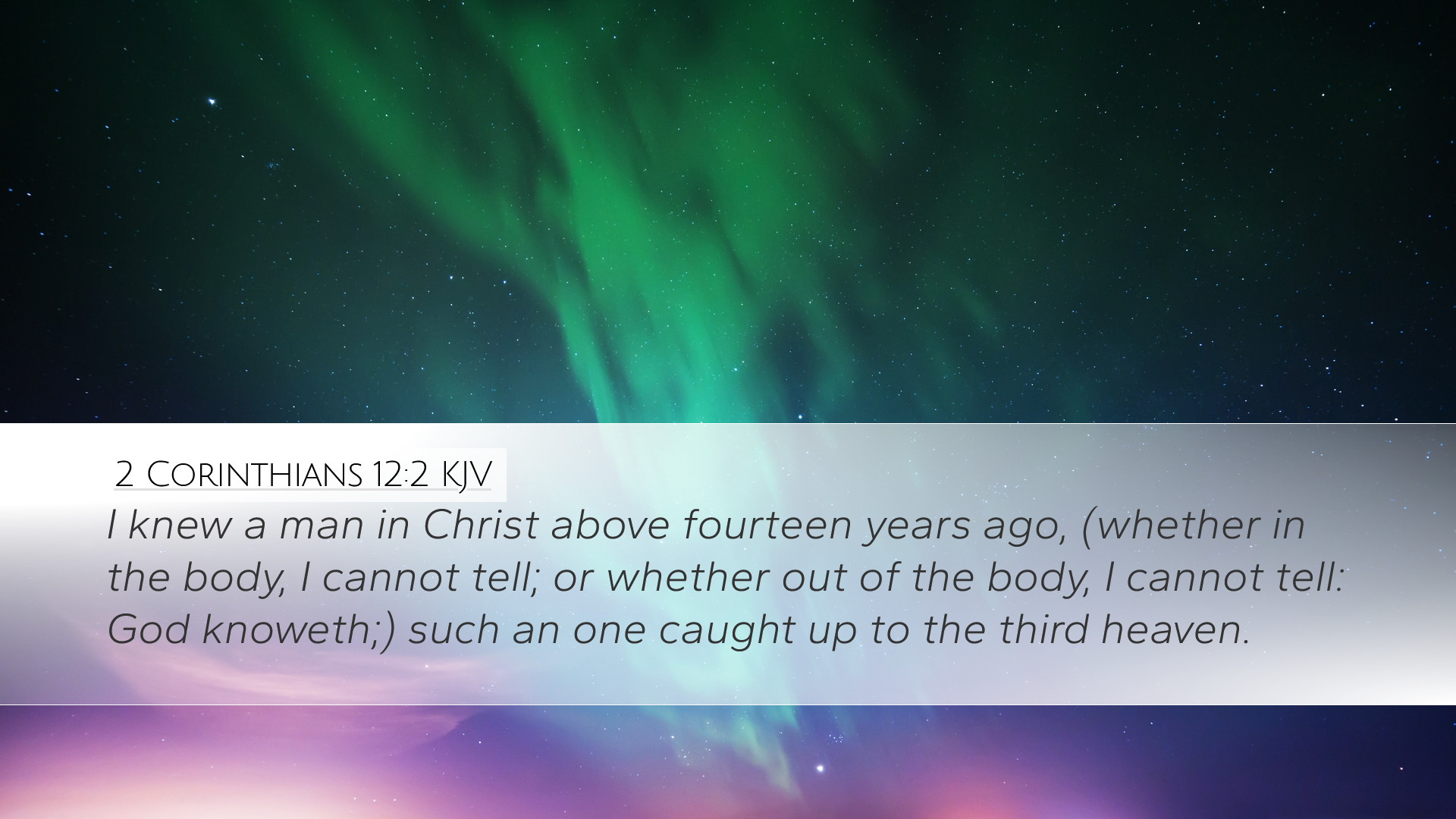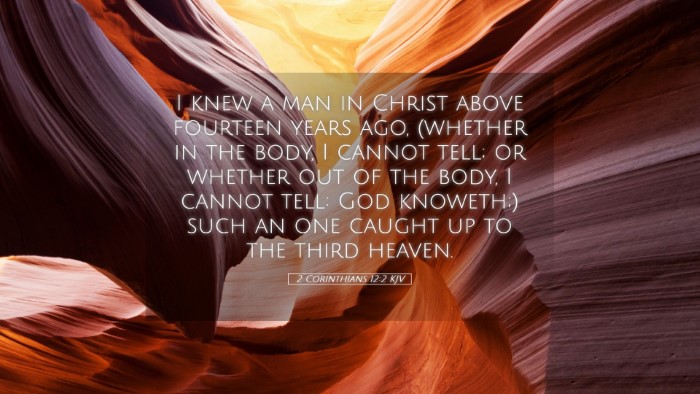Commentary on 2 Corinthians 12:2
Verse Context: 2 Corinthians 12:2 states, "I knew a man in Christ above fourteen years ago, (whether in the body, I cannot tell; or whether out of the body, I cannot tell: God knoweth;) such an one caught up to the third heaven."
Overview of 2 Corinthians 12:2
This verse is part of the Apostle Paul's discussion on his visions and revelations from the Lord. Paul recounts an experience that had a profound impact on his ministry and demonstrates the authority of his apostleship. It serves as a backdrop for understanding the nature of spiritual experiences, humility, and the work of God in the lives of believers.
Insights from Public Domain Commentaries
Matthew Henry's Commentary
Matthew Henry provides a detailed look into the significance of Paul's experience. He emphasizes that Paul does not speak of this man directly in the first person, likely to maintain humility and avoid boasting. This anonymity serves to reflect his sincerity and the seriousness of his revelations.
Henry notes that being "caught up to the third heaven" implies an experience of being in God's direct presence and understanding the depth of divine mysteries. He elaborates on the idea of the "third heaven," suggesting layers of heavenly realms, with the third being in the very presence of God.
Key Takeaway: Paul’s experience illustrates a profound encounter with divine revelation, highlighting God's grace and the transcendence of heavenly realms.
Albert Barnes' Notes
Albert Barnes elaborates on the phrase "whether in the body, I cannot tell; or whether out of the body, I cannot tell." He interprets this as Paul's acknowledgment of the limitations of human understanding concerning spiritual experiences. Paul remains cautious and does not claim to fully grasp the nature of his experience.
Barnes further reflects on the purpose of such experiences. He asserts that spiritual encounters enrich one's ministry and affirm the reality of the spiritual realm. Additionally, he notes that being "caught up" signifies a divine action, stressing God's sovereignty in such experiences.
Key Takeaway: The ambiguity concerning the physical state during the heavenly vision underscores the divine mystery and the believer's journey in discerning God's presence.
Adam Clarke's Commentary
Adam Clarke highlights that the “third heaven” refers to a specific place where God's glory resides. Clarke engages in a theological discourse about the nature of heaven, suggesting that there are different states or realms through which believers may encounter God’s presence.
Clarke stresses that Paul's reluctance to disclose more about his experience underscores a holy reverence towards the divine. By keeping the focus on God rather than himself, Paul exemplifies the humility required of all believers who encounter the divine.
Key Takeaway: Clarke's comments reinforce the importance of humility in spiritual experiences and underscore the communal nature of spiritual life, reminding readers that such revelations are ultimately for the edification of the church.
Theological Implications
The insights gathered from these commentaries provide a rich foundation for understanding the theological implications of 2 Corinthians 12:2:
- The Nature of Revelation: Paul’s experience exemplifies how God can reveal Himself in profound ways, challenging Christians to seek a deeper relationship with Him.
- Humility Before God: The humbleness with which Paul presents his experience serves as a model for all believers to emulate when discussing spiritual encounters.
- Experiential Faith: The personal nature of faith and revelation emphasizes that believers may encounter God on a personal level, which can then inspire collective faith experiences within the church community.
- Spiritual Authority: Paul’s authority as an apostle is affirmed through this divine revelation, urging contemporary faith leaders to recognize the power of personal experiences with God in their ministries.
Practical Application
For pastors, students, theologians, and Bible scholars, the study of 2 Corinthians 12:2 invites several practical applications:
- Encouragement in Trials: The acknowledgment of spiritual experiences can serve to strengthen believers during trials, encouraging them to seek God fervently.
- Cultivating Spiritual Discernment: Understanding the nature of revelations fosters greater discernment in evaluating spiritual experiences in the lives of congregants.
- Promoting Community Discussions: Leaders can facilitate discussions about personal encounters with God to build community and strengthen faith.
- Teaching on Humility: Teaching on humility from Paul’s example can help combat pride and self-exaltation within church leadership and participation.
Conclusion
2 Corinthians 12:2 serves as a profound reminder of God’s majesty and the depths of spiritual revelation. It calls the church to a higher understanding of humility, divine encounter, and a commitment to nurturing communal faith experiences. By drawing insights from esteemed commentators such as Matthew Henry, Albert Barnes, and Adam Clarke, one can appreciate the layers of meaning contained in this verse and its application in today's church context.


